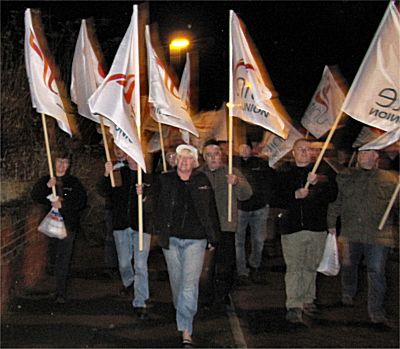for diverse, democratic and accountable media
Superdrug strikers march back to work
news |Posted by Granville Williams
 At 5.30am on Tuesday 24 November Superdrug strikers assembled by the Barnsley Oak pub in South Elmsall to march back to work at the Superdrug depot. The day before they had voted by 185 votes to 59 to accept the deal thrashed out after eight hours of talks at ACAS the previous Friday.
At 5.30am on Tuesday 24 November Superdrug strikers assembled by the Barnsley Oak pub in South Elmsall to march back to work at the Superdrug depot. The day before they had voted by 185 votes to 59 to accept the deal thrashed out after eight hours of talks at ACAS the previous Friday.
Twenty days before the 261 union members, after an 86% vote in favour of strike action, walked out on indefinite strike at exactly the same time, 5.30am, following months of futile negotiation with management.
Management wanted to drive through changes in shift pay and overtime payments which would have left some workers out of pocket by more than 2000. They wanted the power to change and schedule shifts with only seven days notice and the workforce to opt out of the 48-hour European Working Time Directive. They also wanted to cut sick pay and change pension entitlements.
Superdrug, the UKs second largest health and beauty retailer with 1,000 stores and 16,000 staff is part of a worldwide conglomerate, Hutchison Whampoa of Hong Kong, which has an annual turnover in excess of 10 billion. The changes they sought to impose may have seemed small beer to top management, but for the workers in South Elmsall, a former pit village, it was the difference between a living wage and living on benefits.
What happened next was inspirational. Teams of strikers fanned out all over the country giving out 110,000 leaflets outside 150 Superdrug shops informing shoppers of the management assault on their wages and working conditions.
Outside the Superdrug depot the strikers dug in for a long strike, mounting a lively twenty-four hour, seven day a week picket. A local butcher, Voddens, supplied meat for the picket barbecue, and workers from the other depots on the industrial estate supplied wood for the picket line fires.
Support for the strikers poured in from other areas of the trade union movement. My own National Union of Journalists branch, Leeds, sent a cheque for 100 and a bucket collection at out national conference in Southport raised 545.60 and 0.90 cents (our membership covers all of Ireland).
The workforce included 30 Polish workers who also were out on strike, and 20 former miners from the 1984-85 strike. The senior steward, Stephen Benn, was at Frickley Colliery. He commented, Weve done well. We got them to the table in three weeks. I thought it would take longer. Another former miner said to me on the picket line, I didnt think we would be out again twenty-five years later. But he also said they had put into practice lessons learned during the strike - regular mass meetings, and the active involvement of strikers so that people did not sit at home moping.
The return to work was also a poignant reminder of the different end to the 1984-85 miners strike when the Frickley miners marched back behind their banner. But even after a year on strike, when the Kent miners in a desperate last action mounted a picket outside the colliery, the miners refused to cross it and turned back. This time as the strikers marched through the gate into the depot celebratory rockets were fired off.
DATELINE: 25 January, 2010
Share

 be the first to comment
be the first to comment